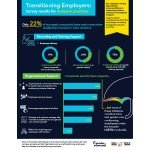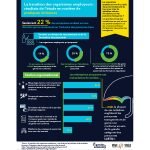Executive summary
In 2019, Pride at Work Canada and the Institute for Gender and the Economy at the University of Toronto’s Rotman School of Management partnered to undertake the first Canadian study dedicated to understanding workplace policies and practices for supporting trans and gender non-conforming people—meaning individuals whose gender identity, or personal experience of gender, differs from their sex assigned at birth. We surveyed 69 organizations in Pride at Work Canada’s membership network (a 58% response rate of all members contacted at the time of the survey), which is made up of organizations who are committed to LGBTQ2+ inclusion. These organizations collectively employ more than 700,000 people across Canada.
The aim of the study was to document the policies and practices for supporting trans and gender non-conforming people applied by Canada’s large employers. Because all respondents are partners of Pride at Work Canada, we believe the results here represent a best-case scenario as non-partners and non-respondents are likely to have fewer gender-inclusive practices.
This groundbreaking survey dedicated to gender-inclusive workplace policies and practices in Canada shows that while a substantial portion of organizations surveyed have anti-discrimination policies and training that includes gender identity and gender expression, only a fraction of these organizations have broader inclusion policies aimed at providing equitable professional opportunities for trans and gender non-conforming people. Because trans and gender-non-conforming people experience stigma and stereotypes about how men and women ought to look, they will not have access to or even seek employment in prominent organizations unless those organizations take deliberate steps towards inclusion. This is especially true for people who have gender expressions that do not conform to norms about the physical appearance of men and women, and for those who have experienced multiple forms of discrimination, such as ableism, racism, and sexism in addition to transphobia.
The survey found that individual accommodations for employees based upon gender identity and gender expression protections do not adequately address the effects of institutionalized stigma, which negatively influence everyday workplace interactions and present barriers to hiring for trans and gender non-conforming people. The report shows how organizations can invest in building a future where all people, including all trans and gender non-conforming individuals, have safe and affirming workplaces.
DOWNLOAD THE FULL REPORT (IN ENGLISH/EN FRANÇAIS).
DOWNLOAD THE SURVEY RESULTS FOR INCLUSIVE PRACTICES INFOGRAPHIC (IN ENGLISH/EN FRANÇAIS)
DOWNLOAD THE SURVEY RESULTS FOR BASIC ACCOMMODATIONS INFOGRAPHIC (IN ENGLISH/EN FRANÇAIS)
__________________________
Report written by:













